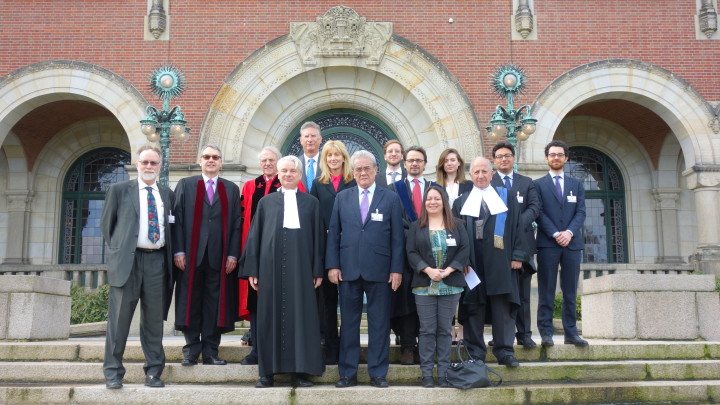|
The Marshall Islands' Nuclear Zero Cases in the International Court of Justice:
Background and Current Status
Lawyers Committee on Nuclear Policy/April 2016
On April 24, 2014, the Republic of the Marshall Islands (RMI) filed applications in the International Court of Justice against the nine nuclear-armed states, claiming they have violated their nuclear disarmament obligations under the Non-Proliferation Treaty (NPT) and customary international law. The respondent states are the United States, United Kingdom, France, Russia, China, India, Pakistan, Israel, and North Korea. The RMI also filed a companion case against the United States in U.S. federal court.
This is the first time the International Court of Justice (ICJ) has been asked to address issues relating to nuclear weapons since its 1996 advisory opinion, in which it unanimously concluded that there "exists an obligation to pursue in good faith and bring to a conclusion negotiations leading to nuclear disarmament in all its aspects under strict and effective international control." The cases serve to bring the legal obligations relating to nuclear disarmament back to the center of debate and action, where they belong, and to ensure that the ICJ's 1996 opinion is not allowed to lie dormant and be ignored.
|

The legal team representing the Republic of the Marshall Islands at the ICJ
in The Hague. (Image by Rick Wayman, Nuclear Age Peace Foundation)
|
|
The Lawyers Committee on Nuclear Policy and its international body, the International Association of Lawyers Against Nuclear Arms (IALANA), were active in relation to the 1996 case, and we are now well represented on the International Legal Team for the Marshall Islands in the current ICJ cases. The Nuclear Age Peace Foundation is serving as consultant to the RMI and is represented on the International Legal Team by David Krieger.
The ICJ filings are contentious cases, in which the Court gives a binding judgment. While a judgment is formally binding only on the parties to the case, nonetheless the Court's interpretation and application of the law will be authoritative with respect to other states as well.
Three of the nine states possessing nuclear arsenals, the UK, India, and Pakistan, have accepted the compulsory jurisdiction of the Court when the opposing state has done so, as the Marshall Islands has. The cases are proceeding as to those states, and developments can be followed on the ICJ website, www.icj-cij.org.
As to the other six states, RMI is calling on them to accept the jurisdiction of the Court in these cases and to explain to the Court their positions regarding the nuclear disarmament obligations. None have done so, and China notified the Court that it declines to accept the Court's jurisdiction in this matter.
The claims in the ICJ cases are for:
- breach of the obligation to pursue in good faith negotiations leading to nuclear disarmament, by refusing to commence multilateral negotiations to that end and/or by implementing policies contrary to the objective of nuclear disarmament;
breach of the obligation to pursue negotiations in good faith on cessation of the nuclear arms race at an early date;
breach of the obligation to perform the above obligations in good faith, including by planning for retention of nuclear forces for decades into the future;
- failure to perform obligations relating to nuclear disarmament and cessation of the nuclear arms race in good faith by effectively preventing the great majority of non-nuclear weapon states from fulfilling their part of those obligations.
For the NPT nuclear-weapon states, the U.S., UK, France, Russia, and China, the claims are made under both the NPT and customary international law.
- For the four states possessing nuclear arsenals outside the NPT, India, Pakistan, Israel, and North Korea, the claims are made under customary international law only. The customary obligations are based on widespread and representative participation of states in the NPT and the long history of United Nations resolutions on nuclear disarmament, and reflect as well the incompatibility of use of nuclear weapons with international law.
- The relief requested is a declaratory judgment of breach of obligations relating to nuclear disarmament and an order to take, within one year of the judgment, all steps necessary to comply with those obligations, including the pursuit, by initiation if necessary, of negotiations in good faith aimed at the conclusion of a convention on nuclear disarmament in all its aspects under strict and effective international control.
Hearings on preliminary issues in each of the three active cases against India, Pakistan, and the United Kingdom took place from March 7 – 16, 2016, in The Hague. The Court's rulings on those issues are expected later in 2016. If the Court rejects the preliminary objections of the respondent states, the cases will go forward to a merits phase. The written and oral proceedings on preliminary issues are available at www.icj-cij.org.
The International Legal Team is headed by the two Co-Agents of RMI: Tony de Brum, Former RMI Foreign Minister, and Phon van den Biesen, an Amsterdam-based lawyer and longtime IALANA member. Other members of the team are Laurie Ashton, Keller Rohrback, USA; Nicholas Grief, Doughty Street Chambers, London, and Professor of Law, University of Kent; Christine Chinkin, Professor of International Law, London School of Economic and Political Science; John Burroughs, Executive Director, Lawyers Committee on Nuclear Policy, UN Office of IALANA; David Krieger (consultant), President, Nuclear Age Peace Foundation; Peter Weiss (consultant), Co-President, IALANA; Luigi Condorelli, Professor of International Law, University of Florence, and honorary Professor of International Law, University of Geneva; Paolo Palchetti, Professor of International Law, University of Macerata; and Roger S. Clark, Board of Governors Professor, Rutgers Law School, Camden, and member of the LCNP Consultative Council.
In the case filed in U.S. court, on February 3, 2015, the U.S. District Court for Northern California granted a U.S. motion to dismiss on grounds of non-justiciability. The RMI is appealing the decision. For more information, see www.nuclearzero.org. In that case, the RMI is represented by the U.S. law firm Keller Rohrback.
|
